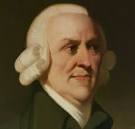Economics As Moral Philosophy
&
The Second Gilded Age Robber Barons
Economics As Moral Philosophy
Economics is a fairly new term, replacing its original meaning as a branch of Moral Philosophy. Most basically, economics is the ethical allocation of resources in society.
What is that? Here's one explanation, Economics: A Branch of Moral Philosophy.
| Moral philosophy is the study of right and wrong, good and evil, better and worse. These polarities cannot be translated into quantitative and measurable terms and, for that reason, moral philosophy is sometimes discredited as lacking scientific objectivity. And it is not, in fact, a science in the sense that mathematics, chemistry, and physics are sciences. The effort of many economists to make the study of political economy a natural science draws the subject out of its broader discipline of moral philosophy, which leads in turn to social mischief. |
This is arcane stuff for many. So here's another description, Recovering Adam Smith's ethical economics,
Adam Smith is famous for founding economics as an independent field of study by synthesizing and systemizing classical economics in The Wealth of Nations. But he was also a significant moral philosopher in his own right who deserves to be recognized alongside his close friend David Hume as a key figure in the Scottish Enlightenment. Smith saw economics as a branch of moral philosophy, and he saw capitalism as an ethical project whose success required political commitment to justice and freedom, not merely an understanding of economic logistics.
...These days Adam Smith is most familiar to us as an economist, and specifically as the defender of the famous Invisible Hand of free-market economics, wherein the private self-interested actions of private individuals, mediated through free markets, generate results that are good for all. (Chicago School - see below) |
This is what Adam Smith's The Wealth of Nations is all about, right? Wrong. The article continues,
However the popular view of Smith that has resulted from this emphasis is twice distorted. Firstly, it is based on the narrow foundations of a few select quotations...
...and secondly these quotations have been analyzed in a particularly narrow way. Both selection and interpretation have been driven by contemporary economists’ interest in justifying orthodox economic methodology and their peculiar (Mandevillian) assumption of the selfish utility maximizing homo economicus. |
 |
And here's the reality of Adam Smith's economics (emphasis added),
But anyone who cares to read Smith’s Wealth of Nations for themselves will find an economics discussed and justified in explicitly moral terms, in which markets, and the division of labour they allow, are shown to both depend upon and produce not only prosperity but also justice and freedom, particularly for the poor. With those concerns in mind, it should not be surprising that Smith was a staunch and vehement critic of those particularly grotesque sins associated with early capitalism: European empires and the slave trade. |
If actually alive today Adam Smith would be repelled by modern economists for their misrepresenting his work as endorsing what is actually Laissez-faire economics,
| ...an economic environment in which transactions between private parties are free from intrusive government restrictions, tariffs, and subsidies, with only enough regulations to protect property rights. The phrase laissez-faire is French and literally means "let [them] do," but it broadly implies "let it be," "let them do as they will," or "leave it alone." |
Laissez-fair economics, not Adam Smith's moral philosophy economics, is what the Chicago School of Economics has championed and taken over modern economic theory on the U.S. political right. In fact, Recovering Adam Smith's ethical economics, points out,
| The Chicago School economist George Stigler once famously declaimed, "I bring you greetings from Adam Smith, who is alive and well and living in Chicago." What such 'historians' have achieved is the diminution of Smith’s economics to those bits which can be claimed to be early (and flawed) fore-runners of contemporary economic concepts and techniques. |
The Haunting: Government is not the solution to our problem; government is the problem
It was by combining Reagan’s First Inaugural in 1981: Government is not the solution to our problem; government is the problem with the Chicago School's perversion of Adam Smith's moral philosophy (actually Laissez-faire economics), that Second Gilded Age robber barons emerged to dominant society.
By transforming the Republican Party into one dominated by Government is not the solution to our problem; government is the problem philosophy, a cabal of the wealthy emerged that then dug deeply into America's fear of authority and its mystical paranoia -- to gain control.
The Tea Party emerged as the voice of libertarianism. The NRA became to protector of freedom through guns. The fundamentalist Christians hawked their anti abortion, anti gay, anti women, anti sex, anti drug, anti government and America is Christian nation theocracy. And, of course, these groups are all anti climate change, pro oil, pro war, Muslim hating and most of all, indulging in a resurgence of racism with Obama in the White House.
The message, most powerfully done by FOX, became a war against Christian white people -- the victims! The power of this message to is perhaps most alarmingly seen in FOX's annual protests against the War On Christmas. All of this has naturally enriched the rich.
The Second Gilded Age Robber Barons
The other day I came upon this terrific article, Back to the future with monopoly capitalism. I shared this with a neighbor, who was also an economics major, Back to the future with monopoly capitalism.
Dear F.E. (fellow economist, moral philosopher),
This article hits what I've been belatedly realizing in the cycle of three Dasas (planetary cycles) in the U.S. chart -- repeating now from the late 19th century and early 20th century: Gilded Age, contraction and finally Progressive Age.
The First Gilded Age peaked in the 1880s. The U.S. was in contraction most of the 1890s, due to over-lending in real estate and railroads. The First Progressive Age began in 1901under Teddy Roosevelt. We just finished the Second Gilded Age during G.W. Bush's terms. We're in the contraction cycle now -- caused by over-lending in real estate and automobiles. I call this the Millennium Contraction. The Second Progressive Age begins at the end of 2015 -- rebalancing shared democratic values.
The hit is that the First Gilded Age was characterized by robber barons creating basic industries that dominated society -- to their benefit and to the loss of "everyone else" -- steel, railroads, oil, electricity. The Pinkertons were their bought and paid for army putting down uprisings. Living standards in America actually when down during the closing decades of the 19th century. Yes, the economy expanded, but at great cost, and when the First Gilded Age trusts were finally broken up in the First Progressive Age, the economy really took off.
The Second Gilded Age is characterized by new basic industries of mostly tech. Bill Gates, for example, is the new Andrew Carnegie. Steve Jobs is the new John D. Rockefeller... They bought and paid for the militarized police to keep the rabble outside their security gates. So, beyond the issue of giant corporations having monopolies and oligopolies (a small group of companies colluding to control an industry), there's the greater reality of the new robber barons who have accumulated tremendous wealth and power in creating these twenty-first century industries and are truly the enemy. And what do they want? MORE, MORE, MORE. From this view, Bill Gates, being the greatest monopolist in history, is also history's greatest criminal. Of course, we don't want to forget the banks, who are always the facilitators of economic unfairness.
| One day we can debate about Bill Gates. He is, after all, a monopolist -- and Steve Jobs once famously said, "Bill Gates never invented anything." Gates literally stole everything from others. Too bad, though, that Jobs wasn't exactly an an angel either, but he was the Thomas Edison of our times. |
I can't believe I only began to understand this a couple of months ago.
I've been writing about this stuff now for years and years. See the Celestial Wheel home page, specifically History Repeats Series, and within that, you'll find Through The Second Gilded Age is the easiest and clearest exposition of this three planetary cycles (Dasas) sequence. You know the Dasas work, for I've shown you how they have functioned in your own life.
(Note: the roaring twenties, followed by the Great Depression and then finally the post WWII economic boom may appear similar, but truly it's not. That was a different set of Dasas, and truly, the results are not consistent with what's been happening now.)
|

The Celestial Wheel 2002-2013©
VedicLeaks 2013©
Doug Riemer |
|


